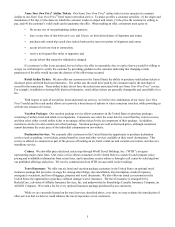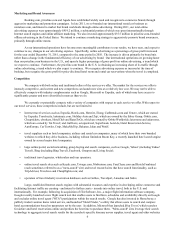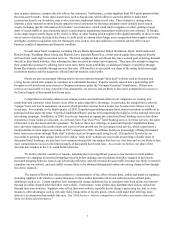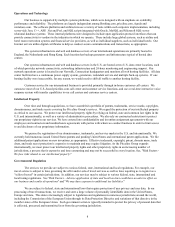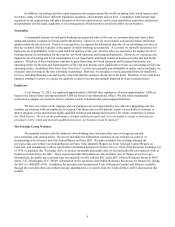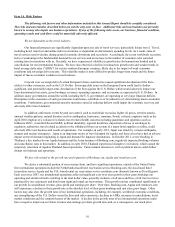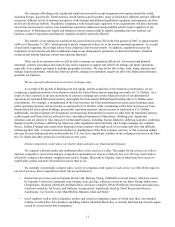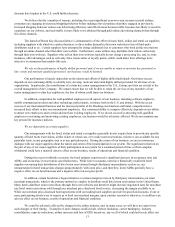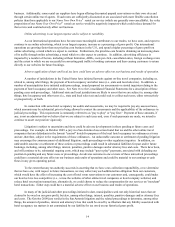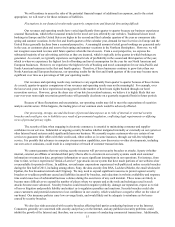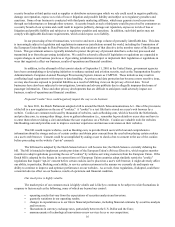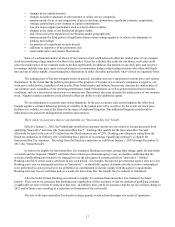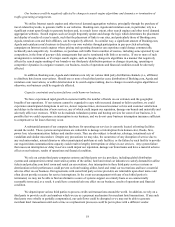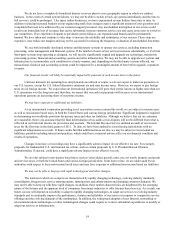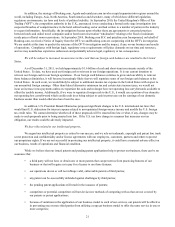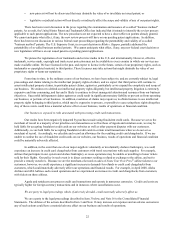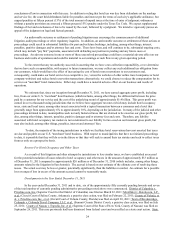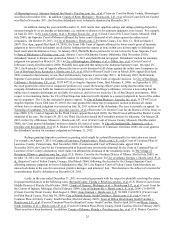Priceline 2011 Annual Report Download - page 16
Download and view the complete annual report
Please find page 16 of the 2011 Priceline annual report below. You can navigate through the pages in the report by either clicking on the pages listed below, or by using the keyword search tool below to find specific information within the annual report.15
We will continue to assess the risks of the potential financial impact of additional tax exposure, and to the extent
appropriate, we will reserve for those estimates of liabilities.
Fluctuations in our financial results make quarterly comparisons and financial forecasting difficult.
Our revenues and operating results have varied significantly from quarter to quarter because our business experiences
seasonal fluctuations, which reflect seasonal trends for the travel services offered by our websites. Traditional leisure travel
bookings in Europe and the United States are higher in the second and third calendar quarters of the year as consumers take
spring and summer vacations. In the first and fourth quarters of the calendar year, demand for travel services in Europe and the
United States generally declines from a seasonal perspective. A meaningful amount of retail gross bookings are generated early
in the year, as customers plan and reserve their spring and summer vacations in the Northern Hemisphere. However, we will
not recognize associated revenue until future quarters when the travel occurs. From a cost perspective, we expense the
substantial majority of our advertising activities as they are incurred, which is typically in the quarter in which bookings are
generated. As a result, we typically experience our highest levels of profitability in the second and third quarters of the year,
which is when we experience the highest levels of booking and travel consumption for the year for our North American and
European businesses. However, we experience the highest levels of booking and travel consumption for our Asia-Pacific and
South American businesses in the first and fourth quarters. Therefore, if these businesses continue to grow faster than our
North American and European businesses, our operating results for the first and fourth quarters of the year may become more
significant over time as a percentage of full year operating results.
Our revenues and operating results may continue to vary significantly from quarter to quarter because of these factors.
As a result, quarter-to-quarter comparisons of our revenues and operating results may not be meaningful. For example, over
the last several years we have experienced strong growth in the number of hotel room nights booked through our hotel
reservation services. However, given the sheer size of our hotel reservation business, we believe it is highly likely that our
year-over-year room night reservation growth rates will generally decelerate on a quarterly sequential basis in future periods.
Because of these fluctuations and uncertainties, our operating results may fail to meet the expectations of securities
analysts and investors. If this happens, the trading price of our common stock would be adversely affected.
Our processing, storage, use and disclosure of personal data exposes us to risks of internal or external security
breaches and could give rise to liabilities as a result of governmental regulation, conflicting legal requirements or differing
views of personal privacy rights.
The security of data when engaging in electronic commerce is essential to maintaining consumer and supplier
confidence in our services. Substantial or ongoing security breaches whether instigated internally or externally on our system or
other Internet based systems could significantly harm our business. We currently require customers who use certain of our
services to guarantee their offers with their credit card, either online or, in some instances, through our toll-free telephone
service. It is possible that advances in computer circumvention capabilities, new discoveries or other developments, including
our own acts or omissions, could result in a compromise or breach of customer transaction data.
We cannot guarantee that our existing security measures will prevent security breaches or attacks. A party (whether
internal, external, an affiliate or unrelated third party) that is able to circumvent our security systems could steal customer
information or transaction data, proprietary information or cause significant interruptions in our operations. For instance, from
time to time, we have experienced "denial-of-service" type attacks on our system that have made portions of our websites slow
or unavailable for periods of time. In addition, several major corporations experienced well-publicized online security breaches
during the first half of 2011, including among others, Sony, the data security firm RSA, Lockheed Martin, the email wholesaler
Epsilon, the Fox broadcast network and Citigroup. We may need to expend significant resources to protect against security
breaches or to address problems caused and liabilities incurred by breaches, and reductions in website availability and response
time could cause loss of substantial business volumes during the occurrence of any such incident. These issues are likely to
become more difficult as we expand the number of places where we operate and as the tools and techniques used in such
attacks become more advanced. Security breaches could result in negative publicity, damage our reputation, expose us to risk
of loss or litigation and possible liability and subject us to regulatory penalties and sanctions. Security breaches could also
cause customers and potential customers to lose confidence in our security, which would have a negative effect on the value of
our brand. Our insurance policies carry low coverage limits, and would likely not be adequate to reimburse us for losses
caused by security breaches.
We also face risks associated with security breaches affecting third parties conducting business over the Internet.
Consumers generally are concerned with security and privacy on the Internet, and any publicized security problems could
inhibit the growth of the Internet and, therefore, our services as a means of conducting commercial transactions. Additionally,


